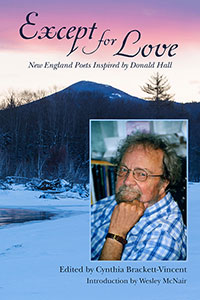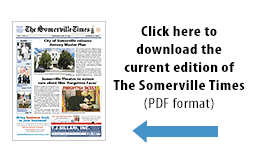 *
*
Review by Lawrence Kessenich
No doubt inspired by the 2018 death of well-loved New England poet Donald Hall, this anthology pays tribute to Hall through poems about him and his beloved wife, Jane Kenyon, poems dedicated to him (or them), and poems responding to Hall’s work. At least half-a-dozen of the poems are inspired by specific poems Hall wrote, such as Scott T. Hutchinson’s Wild Honey, after Hall’s Self-Portrait as a Bear; Tricia Knoll’s Obsessed Haiku, after Hall’s Distressed Haiku; and Kyle Potvin’s Waiting for the Results, after Hall’s Her Long Illness.

Except for Love
New England Poets Inspired by Donald Hall
Edited by Cynthia Brackett-Vincent
(Encircle Publications, 2019)
Some of the poets here seem to have known Hall and Kenyon, their poems providing specific images from their life together, while others admired the poets’ work from afar. Kenyon is secondary in this anthology, of course, it being dedicated to Hall, but the two poets, married to each other for decades, were so intertwined, that it would be nearly impossible to put together a book about Hall without including something about Kenyon’s significance in his life. For example, Steven Rattner’s poem All the Time in the World, dedicated to “Don and Jane,” appears to be written from Hall’s point-of-view, saying things about their life together such as:
One morning we taste salvation
in a swallow of milk.
There is frost scaling the bedroom window
and we take it for heaven.
These beautiful lines give a taste of the imagistic treasures to be found in this anthology. Here are a few others.
From Lunatics by Sherry Barker Abaldo:
You gather me again
and again in your arms
like kindling,
our moonlit skin blue as India gods.
From Seapoint Beach by Mary Anker:
The last winter storm
split
our apple tree
in half
the wound
orange and raw
against her dark bark
points to the sky
hands in prayer…
From Whisper by Andrew Periale:
I want to hear the soft explosions
of humpbacks surfacing; cold, salt spray
soaking our clothes; dark men poised,
their great harpoons held high, waiting.
But there are more abstract poems as well – a place where Hall, for all of his New Hampshire country concreteness, would also sometimes venture, such as in his poem Advent:
When I know that the grave is empty,
Absence eviscerates me,
And I dwell in a cavernous, constant
Horror vacui.
Wally Swist’s A Wild Beauty speaks of how a scent:
nurtures us through what
are calculated avaricious
rants, vortices of disorder,
with what serves us
as an uncanny sustenance
its own inexplicable elixir.
The abstract is never far from the concrete in any of these poems, though (even Hall’s and Swist’s above begin with concrete images, an empty grave and a scent, before they delve into the abstract) so all of the poems feel grounded and vital. There is a lot about loss and decline, but even more about love, bounty, and the uplifting qualities of natural life.
In Ancient History, Dawn Potter’s character Baby tries to forget the loss and decline around her mother, but finds it difficult:
Forgets her skinny fingers
their skinny sharp nails,
her stare like a chain
yanking him under
Forgets how bad she smelled.
But in Over Breakfast Tricia Knoll imagines Hall and Kenyon talking to each other about creativity in language peppered with uplifting natural images:
Did you hibernate last night? Is now when your nut
breaks open? Does your wild aster seed fall
on cracked silt? Your fruited branch bend
under pears?
…
Maybe a murmur in green waters
lapping ashore as one
or going separately. If we must.
This is a book of powerful, varied, vivid poems that don’t shrink from the darker side of life, but which, on the whole, come down on the side of love, creativity, and a deep appreciation for the beauty and richness of nature. Hall and Kenyon would both appreciate it and be proud to have their names associated with it.















Reader Comments